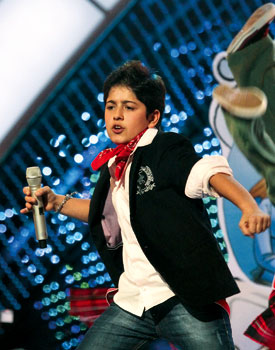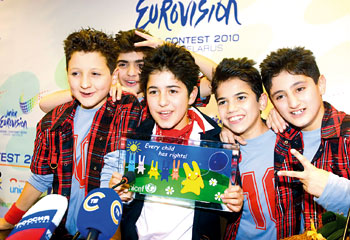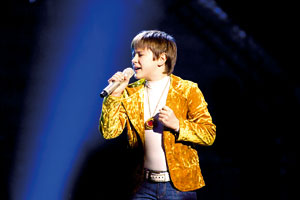 By Viktar Korbut
By Viktar Korbut
Belarus was hosting this most popular contest for young pop performers for the first time, although Belarusian representatives have previously won the event twice. Minsk-Arena — a new sports and cultural facility — hosted the show; it can rival even the Roman Coliseum in scale.
Ten points from Macedonia brought victory to the Armenian performer, allowing him to overtake a Russian duo, singing Boy and Girl. Behind by just one point, Russia came second (with 119 points), having received only one point from Macedonia.
Despite his victory, Vladimir views all entrants of Junior Eurovision as his friends, rather than former rivals. He admits that he is now good friends with Daniil Kozlov of Belarus and Stefan Roscovan of Moldova. “I enjoy their singing and loved the entries by Serbia and Georgia.” According to Vladimir, his stay in the Belarusian capital has left unforgettable impressions. “Minsk is a very beautiful city, which I didn’t expect,” he notes. He performed his Mama (Mother) song at the competition, with his own lyrics and melody.
Vladimir Arzumanyan was born on May 26th, 1998, in Stepanakert, to a family of musical teachers. He studies at the Arts Lyceum, possesses a brown belt in karate and is keen on football. Vladimir began to sing when he was six and performs songs in Armenian, Russian and English.
The Belarusian representative, Daniil Kozlov, 13, from the Brest region’s Zhabinka, finished among the top five at Junior Eurovision, singing Muzyki Svet (Music of Light).
 “Are you happy?” Junior Eurovision host Denis Kuryan asked the winner of the contest, speaking in English. Vladimir Arzumanyan of Armenia didn’t understand him at first. “To sing?” wondered Vladimir, in Russian, remembering that he’d need to perform again as the winner. Mr. Kuryan repeated the question again in Russian and Vladimir responded, “Yes!”
“Are you happy?” Junior Eurovision host Denis Kuryan asked the winner of the contest, speaking in English. Vladimir Arzumanyan of Armenia didn’t understand him at first. “To sing?” wondered Vladimir, in Russian, remembering that he’d need to perform again as the winner. Mr. Kuryan repeated the question again in Russian and Vladimir responded, “Yes!”
Nobody could doubt the answer of the young star from mountainous Armenia, situated at the furthest reaches of Europe. Vladimir Arzumanyan is now famous throughout the continent, having found fame and glory in Minsk, which hosted Junior Eurovision-2010. The Russian duo — Liza Drozd and Sasha Lazin — stirred the audience with their Boy and Girl, while Serbian Sonja Skoric was also among those with the highest scores. Mariam Kakhelishvili of Georgia, singing Mari-Dari, came fourth and was called Baby Gaga, because of her resemblance to Lady Gaga.
 The 8th Junior Eurovision brought together entrants from 14 countries, performing at Minsk-Arena: the biggest stage in the history of the children’s event. The contest’s finals and two open rehearsals were attended by 40,000 people. Maria Guleghina, a world opera state and UNICEF Goodwill Ambassador, especially arrived in the Belarusian capital to take part in Junior Eurovision, alongside Eurovision-2009 winner Alexander Rybak (a Belarus-born Norwegian). Mr. Rybak admitted that he was greatly delighted by Daniil Kozlov’s song and praised the organisation of Junior Eurovision in Minsk; he described it as being ‘just as good as that in Oslo’. Mr. Rybak sang a song about Europe. “I’ve sung as if about a girl, but my words actually refer to Europe,” he explained, adding, “I’m very pleased to again visit Belarus, my homeland. It’s always so quiet and calm here.”
The 8th Junior Eurovision brought together entrants from 14 countries, performing at Minsk-Arena: the biggest stage in the history of the children’s event. The contest’s finals and two open rehearsals were attended by 40,000 people. Maria Guleghina, a world opera state and UNICEF Goodwill Ambassador, especially arrived in the Belarusian capital to take part in Junior Eurovision, alongside Eurovision-2009 winner Alexander Rybak (a Belarus-born Norwegian). Mr. Rybak admitted that he was greatly delighted by Daniil Kozlov’s song and praised the organisation of Junior Eurovision in Minsk; he described it as being ‘just as good as that in Oslo’. Mr. Rybak sang a song about Europe. “I’ve sung as if about a girl, but my words actually refer to Europe,” he explained, adding, “I’m very pleased to again visit Belarus, my homeland. It’s always so quiet and calm here.”
However, it was far from quiet on the Junior Eurovision stage, with emotions running high among entrants and spectators. Passions were also high for other reasons. Svante Stockselius, the Executive Supervisor of the Eurovision Song Contest, noted that there were rumours that this year’s Junior Eurovision was the last ever. “However, I’m convinced of the opposite.
 Several countries have requested the honour of hosting the next contest; we’re currently negotiating,” he explains. He praised the high level of the event’s organisation in Minsk, adding, “This year, the organisers brought together the winners of all previous events on one stage. No one has ever done this before. I’m satisfied with the preparations; the producers clearly worked professionally. I’m also aware that all the delegations and children were pleased to be here.”
Several countries have requested the honour of hosting the next contest; we’re currently negotiating,” he explains. He praised the high level of the event’s organisation in Minsk, adding, “This year, the organisers brought together the winners of all previous events on one stage. No one has ever done this before. I’m satisfied with the preparations; the producers clearly worked professionally. I’m also aware that all the delegations and children were pleased to be here.”
The President of Belarus attended the musical show and called it a special holiday, saying, “It’s no ordinary competition. It’s a true event for Belarus. The whole country is keen on it.” Addressing Jorgen Franck, the Director ad Interim of the European Broadcasting Union’s Television Department, Alexander Lukashenko noted, “If you’ve liked our work, you should also bring the adult Eurovision here. We now boast the basis for organising the adult contest.” Mr. Franck responded that, if a Belarusian performer wins the adult Eurovision, it will certainly come to Minsk. He added that Belarus boasts talented singers.
 The MT’s reference:
The MT’s reference:
The Junior Eurovision Song Contest is organised annually from November-December, under the auspice of the European Broadcasting Union. Each participant performs their own songs. The first contest took place in Copenhagen (Denmark) on November 15th, 2003, and Belarus has been taking part in the event since its foundation. It is the only state to have won twice: in 2005 and 2007. Belarus has been represented at Junior Eurovision by Olga Satsyuk (2003, ranked fourth); Yegor Volchek (2004, 14th place); Ksenia Sitnik (2005, winner); Andrey Kunets (2006, 2nd); Alexey Zhigalkovich (2007, winner); trio Darya Nadina, Alina Molosh and Karina Zhukovich (2008, 6th); and Yuri Demidovich (9th in 2009).











